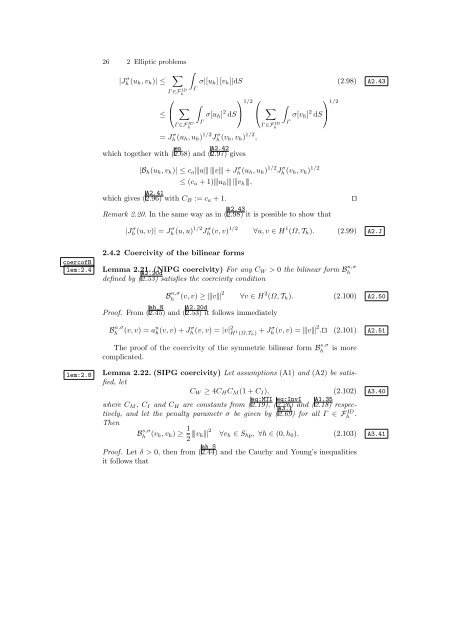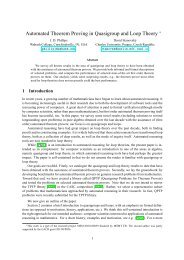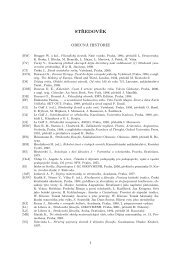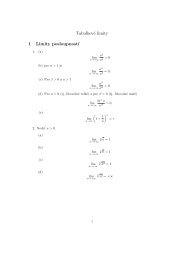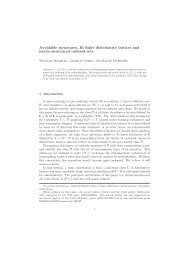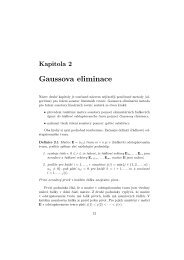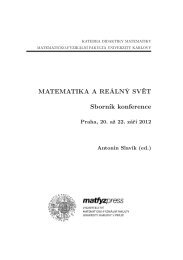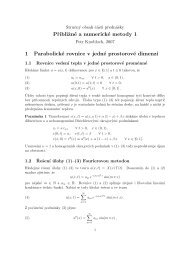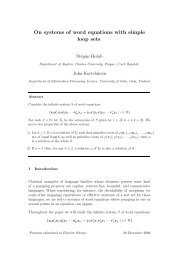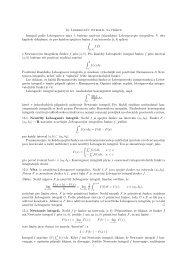2 DGM for elliptic problems
2 DGM for elliptic problems
2 DGM for elliptic problems
You also want an ePaper? Increase the reach of your titles
YUMPU automatically turns print PDFs into web optimized ePapers that Google loves.
26 2 Elliptic <strong>problems</strong><br />
|Jh σ (u h ,v h )| ≤ ∑ ∫<br />
Γ ∈F ID<br />
h<br />
⎛<br />
≤ ⎝ ∑<br />
Γ ∈F ID<br />
h<br />
Γ<br />
∫<br />
σ|[u h ][v h ]|dS (2.98) A2.43<br />
Γ<br />
⎞<br />
σ[u h ] 2 dS⎠<br />
1/2 ⎛<br />
= J σ h(u h ,u h ) 1/2 J σ h(v h ,v h ) 1/2 ,<br />
which together with ( en 2.68) and ( A2.42 2.97) gives<br />
⎝ ∑<br />
Γ ∈F ID<br />
h<br />
∫<br />
Γ<br />
⎞<br />
σ[v h ] 2 dS⎠<br />
|B h (u h ,v h )| ≤ c a |||u||| |||v||| + J σ h (u h ,u h ) 1/2 J σ h(v h ,v h ) 1/2<br />
≤ (c a + 1)|||u h ||| |||v h |||,<br />
which gives ( A2.41 2.96) with C B := c a + 1. ⊓⊔<br />
Remark 2.20. In the same way as in ( A2.43 2.98) it is possible to show that<br />
|J σ h (u,v)| = J σ h(u,u) 1/2 J σ h(v,v) 1/2 ∀u,v ∈ H 1 (Ω, T h ). (2.99) A2.J<br />
1/2<br />
coercofB<br />
lem:2.4<br />
2.4.2 Coercivity of the bilinear <strong>for</strong>ms<br />
Lemma 2.21. (NIPG coercivity) For any C W > 0 the bilinear <strong>for</strong>m B n,σ<br />
h<br />
defined by ( 2.53) A2.20d satisfies the coercivity condition<br />
B n,σ<br />
h (v,v) ≥ |||v|||2 ∀v ∈ H 2 (Ω, T h ). (2.100) A2.50<br />
Proof. From ( ah_N 2.45) and ( A2.20d 2.53) it follows immediately<br />
B n,σ<br />
h (v,v) = an h(v,v) + J σ h(v,v) = |v| 2 H 1 (Ω,T h ) + Jσ h (v,v) = |||v||| 2 .⊓⊔ (2.101) A2.51<br />
The proof of the coercivity of the symmetric bilinear <strong>for</strong>m B s,σ<br />
h<br />
complicated.<br />
is more<br />
Lemma 2.22. (SIPG coercivity) Let assumptions (A1) and (A2) be satis-<br />
fied, let<br />
C W ≥ 4C H C M (1 + C I ), (2.102) A3.40<br />
where C M , C I and C H are constants from ( 2.19), eq:MTI ( 2.26) eq:InvI and ( 2.18) A1.35 respectively,<br />
and let the penalty parametr σ be given by ( 2.69) A3.1 <strong>for</strong> all Γ ∈ Fh ID.<br />
Then<br />
B s,σ<br />
h (v h,v h ) ≥ 1 2 |||v h||| 2 ∀v h ∈ S hp , ∀h ∈ (0,h 0 ). (2.103) A3.41<br />
lem:2.8<br />
Proof. Let δ > 0, then from ( ah_S 2.44) and the Cauchy and Young’s inequalities<br />
it follows that


